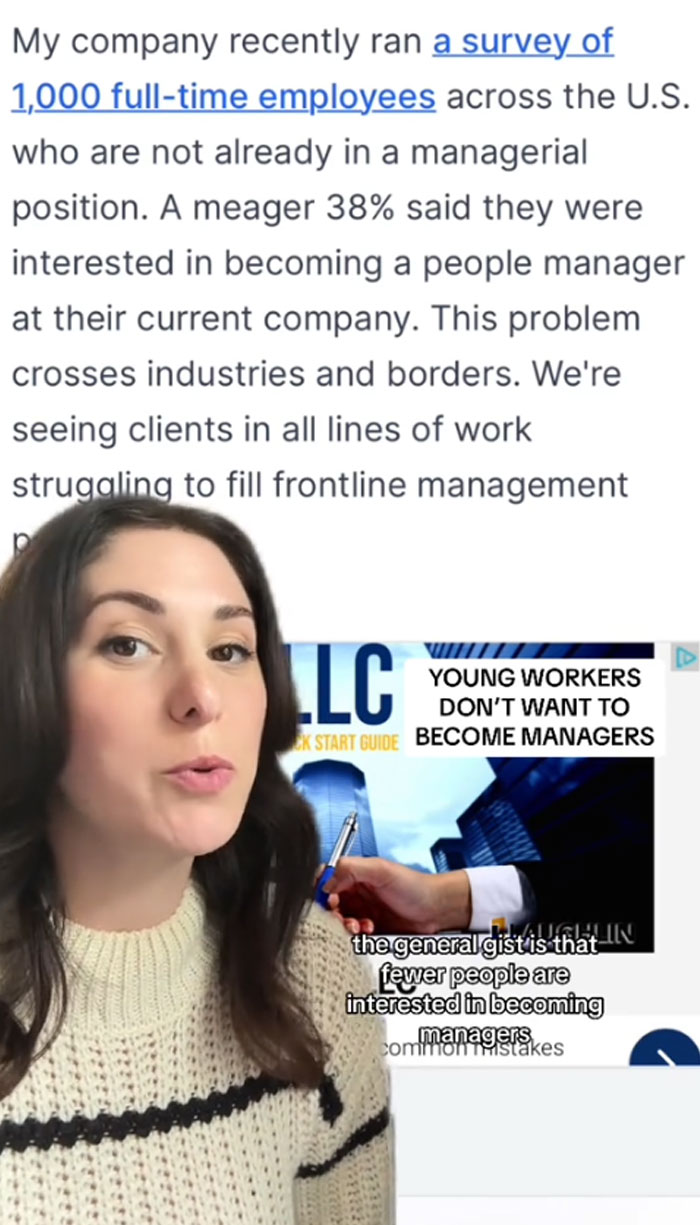Traditionally, the role of manager is coveted, with people going out of their way to compete for it. But recently, many employees have started to stay away from these positions like the plague. TikToker and career consultantKyyah Abdulbroke down all the reasons why Millennials and Gen Z employees are avoiding management roles.
Millennials and Gen Z seem to be resistant to taking management roles

Image credits:BGStock72 (not the actual photo)

Image credits:courageousleadership
“Nobody wants to become a manager anymore. Which I think is some version of ‘nobody wants to work anymore'”

TikToker and career consultant Kyyah Abdul shared her thoughts on why this is the case

Image credits:kyyahabdul
“The reason people don’t want to be a manager anymore is because it’s a glorified unpaid internship. Okay, yeah, you get paid for your work. But the pay is not worth the work that you’re doing, which is why I equate it to an internship.
You start at the associate level, which is entry-level, and you get paid half of the doubloon. You’re not doing that much work. So you’re like, ‘You know what, this is not that bad. But I want to make more money. So let me see if I can advance in my career and become a manager.’”

“So you become a manager and you realize – ‘hold on, I only get a full doubloon, despite doing three times the work I was previously doing as an associate.’ This is where people get to a point in their career that they’re like, ‘You know what, I’m going to take it on the chin, continue to do this work, because I know it’s an internship opportunity to make it to the next level, where I’m really going to start making the pirate’s booty. I’m going to start really getting that lucky charms bag.’
Then you get other people that are like, ‘This isn’t worth it. I’d rather just either stay at the manager level or go back to around the associate level, see if I can get some more money.’ Because there are senior associate levels where you can get, you know, a doubloon and a half, perhaps.”

So how do we get these people out and move these people up to keep the relationship flowing? Well, it’s kind of hard because these people don’t want to leave because of how much money they’re getting for very little work.”

“I personally believe there are people out there that want to be managers and they want to progress up the ladder, but there’s a standstill right here. People aren’t able to move up the ladder because these people aren’t transitioning over to retirement. So I feel like there’s a surplus of people who have been at this manager point for a really long time, and they’re over it.
And then they have like younger people who are associates seeing how burnt out they are at a manager level, not being able to progress. So these people are like, ‘Heck no, I’m not about to go through what these people just went through for only half a doubloon!’”
You can watch the full video here:
These roles come with fewer and fewer advantages and more drawbacks

Image credits:Anna Shvets (not the actual photo)
Bored Pandagot in touch with Kyyah Abdul and she was willing to share some more thoughts on this question. First, we wanted to hear what she thought about middle management’s workload. “Generally speaking I do think mid-level management has always done “most” of the work. It may feel as though it’s a recent development because so many people are becoming more aware of the reality.”
While Kyyah Abdul isn’t wrong to call the position of manager an “internship” for a higher, leadership role, it can also be seen as the equivalent of customer support. While many companies do need customer support roles to actually conduct business, it’s an open secret that this position in many ways exists just to insulate upper management from the complaints of users, clients, or buyers.
In the same way, managers fill this role for leadership in many organizations. They have to make the tough calls and face employee backlash when budgets are cut, even though, often enough, they actually aren’t the ones ultimately responsible for the changes at the end of the day. Yes, they might be paid more and receive more benefits, but, often enough, the increase in wages is not proportional to the stress and workload then placed upon them.
In the past, some people would be willing to bite the bullet for a few years and just tough it out until they can get promoted out of management. But, as Kyyah Abdul mentioned in her video, the people in those upper roles aren’t exactly moving out with any haste. The result is that people end up stuck in management positions that they do not like and often can’t leave without taking a significant cut to their income.
Millennials and Gen Z are more aware of what it actually means to be a manager

Image credits:Mizuno K (not the actual photo)
After all, there are only so many hours in the day, and people realize that a bit more money, at the cost of all of one’s mental energy, isn’t worth it. Similarly, while most people hate it when their companies talk about “being a family,” it’s still good to have friendly and positive relations with your coworkers. Being a manager, in the age of cuts and layoffs makes that nearly impossible.
Commenters shared their thoughts and suggestions for what could be done



















Thanks! Check out the results:You May Like45 Insane Workplace Moments That Got Legendary StatusJustinas KeturkaGuy Works 50+ Hours/Week Only For His Successor To Automate Everything And Have Nothing To DoIndrė Lukošiūtė50 World’s Weirdest Jobs That Pay Out Quite WellAivaras Kaziukonis
Justinas Keturka
Indrė Lukošiūtė
Aivaras Kaziukonis
Work & Money